In the fast-paced world of academia and research, proper citation management is essential for maintaining the integrity and credibility of scholarly work.
With the increasing volume of information available, manually managing citations can be a daunting and time-consuming task.
Thankfully, advancements in artificial intelligence (AI) have led to the development of innovative tools that can automate and streamline the citation management process.
In this article, we will explore the top AI tools for citation management that can help researchers, students, and professionals effectively handle their references.
Discover powerful AI tools for citation management and correct citation generation. Simplify your research process, organize references, and easily create citations in numerous styles such as APA, MLA, and Chicago.
The Importance of Citation Management
Proper citation management plays a crucial role in academic writing, as it acknowledges the contributions of other researchers and allows readers to access the sources referenced.
Accurate citations also help avoid plagiarism, which is a serious ethical offense in scholarly work. However, manually formatting and organizing citations can be time-consuming and prone to errors. This is where AI-powered citation management tools come to the rescue.
Read More: Best AI Tools for Academic Research
Top AI Tools for Citation Management
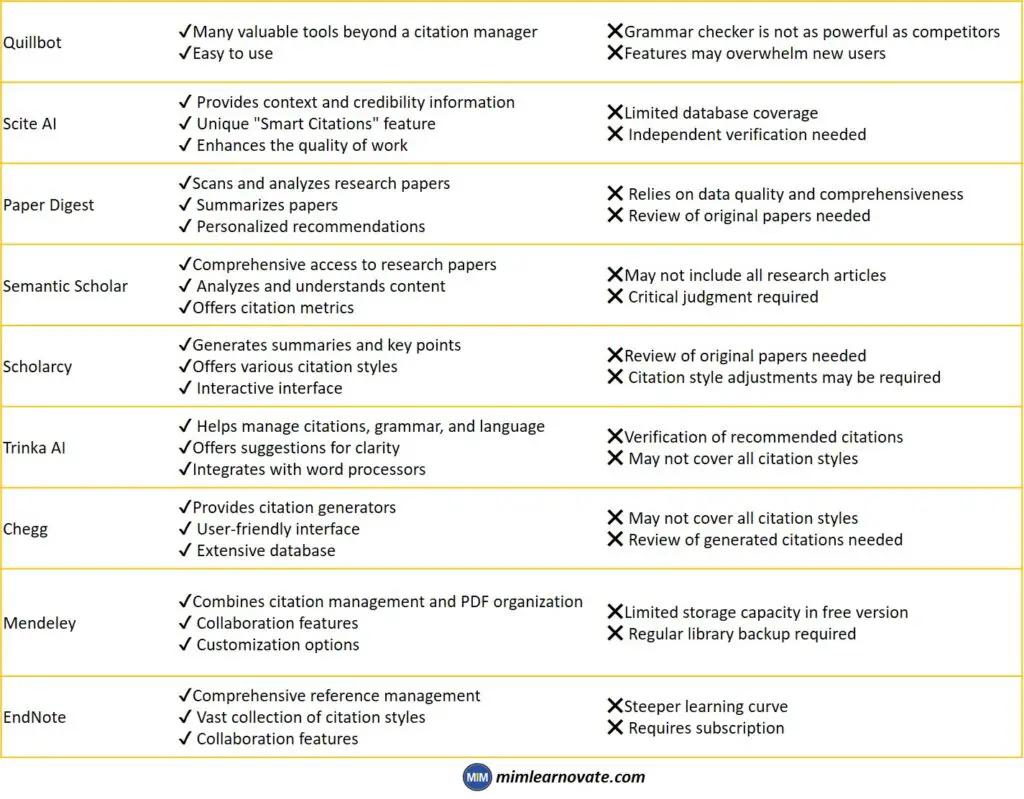
Quillbot
Quillbot was released in 2017 and has over 50 million users. Citation generators are very popular among academics. It formats any link, document, or reference based on the user’s preferred academic style.
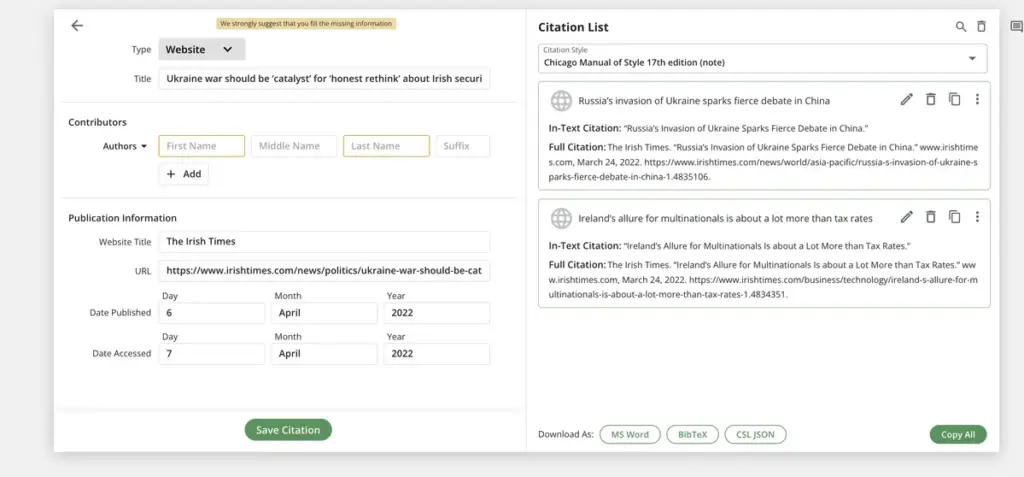
Users can manage a library of citations inside Quillbot and copy the appropriate citation into their essays.
It saved us countless hours of formatting and reviewing references and a bibliography. Customers of Quillbot can use its premium writing tools for academic purposes, particularly the paraphrase and summarizer features.
Read More: How is QuillBot used in Academic Writing?
Pros of Quillbot
- Many valuable tools beyond a citation manager
- Easy to use
- Supports a wide variety of citation styles
Cons of Quillbot
- Grammar checker is not as powerful as competitors
- Features may overwhelm new users
Scite AI
You can format citations in a number of different styles with the help of Scite AI. You may search references and choose the appropriate citation style for your paper with the help of Scite AI.
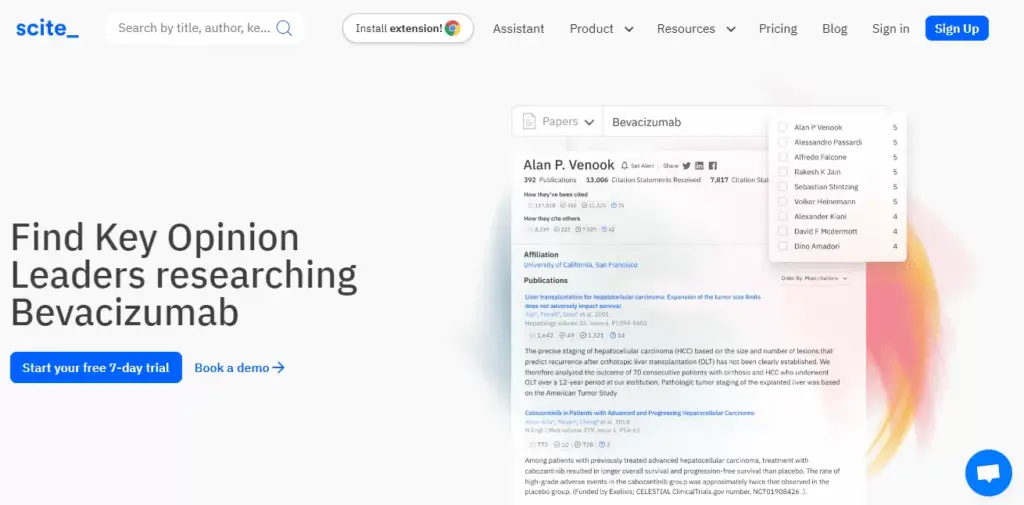
Pros of Scite AI
- Scite AI utilizes AI and natural language processing (NLP) algorithms to analyze citations and provide information on the context and credibility of references.
- It employs a unique “Smart Citations” feature that categorizes citations as supporting, contrasting, or mentioning a particular research paper.
- Scite AI’s advanced technology helps researchers evaluate the impact and reliability of sources, enhancing the quality of their own work.
Cons of Scite AI
- Scite AI’s database may not cover all research articles, which could limit its usefulness for certain disciplines or specific studies.
- While Scite AI provides valuable context for citations, researchers still need to independently verify the accuracy and relevance of the information.
Paper Digest
Paper Digest is a tool that allows you to summarize and cite academic papers. You can find similar publications and determine the key findings with the help of Paper Digest.
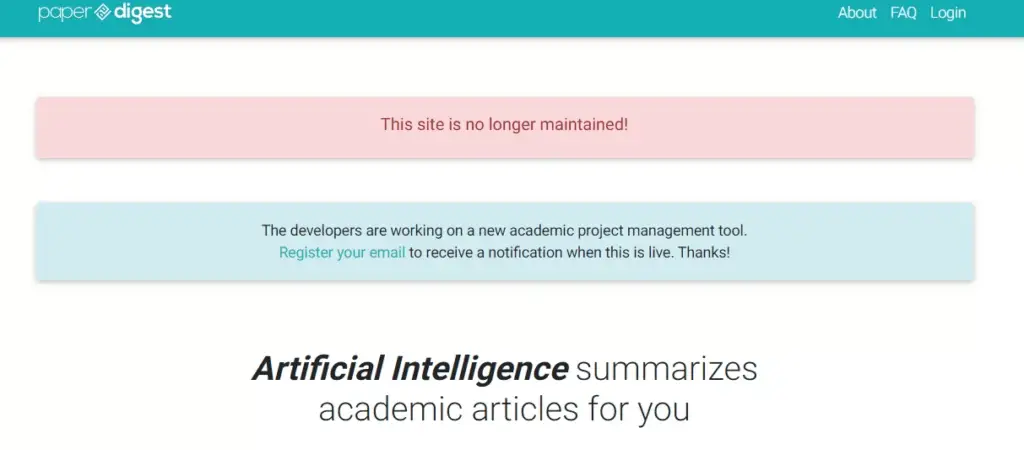
Pros of Paper Digest
- Paper Digest is an AI tool that scans and analyzes research papers, extracting key information such as titles, authors, abstracts, and citations.
- It employs natural language processing to summarize papers, providing researchers with concise overviews that aid in decision-making and citation selection.
- Paper Digest offers personalized recommendations based on users’ research interests, helping them discover relevant papers for citation.
Cons of Paper Digest
- The accuracy of Paper Digest’s summaries and recommendations relies on the quality and comprehensiveness of the data it processes.
- Users should exercise caution and conduct thorough reviews of the original papers to ensure the accuracy and integrity of the citations.
Semantic Scholar
Semantic Scholar is a search engine that employs artificial intelligence to index and organise scientific literature. You can track your research with Semantic Scholar and find sources, related citations, and relevant citations.
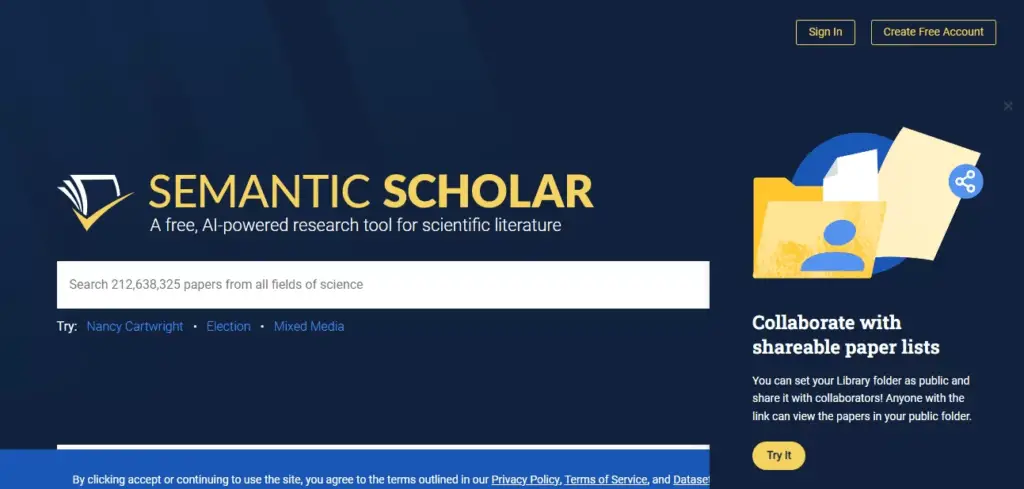
Pros of Semantic Scholar
- Semantic Scholar is an AI-powered academic search engine that provides comprehensive access to research papers and publications.
- It employs machine learning algorithms to analyze and understand the content of papers, making it easier for researchers to find relevant sources for citation.
- Semantic Scholar offers citation metrics, enabling users to assess the impact and influence of specific papers in their fields.
Cons of Semantic Scholar
- While Semantic Scholar covers a wide range of disciplines, it may not include all research articles, particularly those from niche or less well-known sources.
- Users should exercise critical judgment when using Semantic Scholar’s recommendations and conduct additional research to ensure the relevance and quality of the citations.
Mendeley
Mendeley is a citation program that is excellent for departments with multiple users. The program is ideal for annotating documents, sharing references with others, and keeping references organized.
This tool differs from others due to its collaborative aspects. For research staff teams who need to arrange references in many styles, including MLA, APA, and Chicago-style citations, the programme is great.
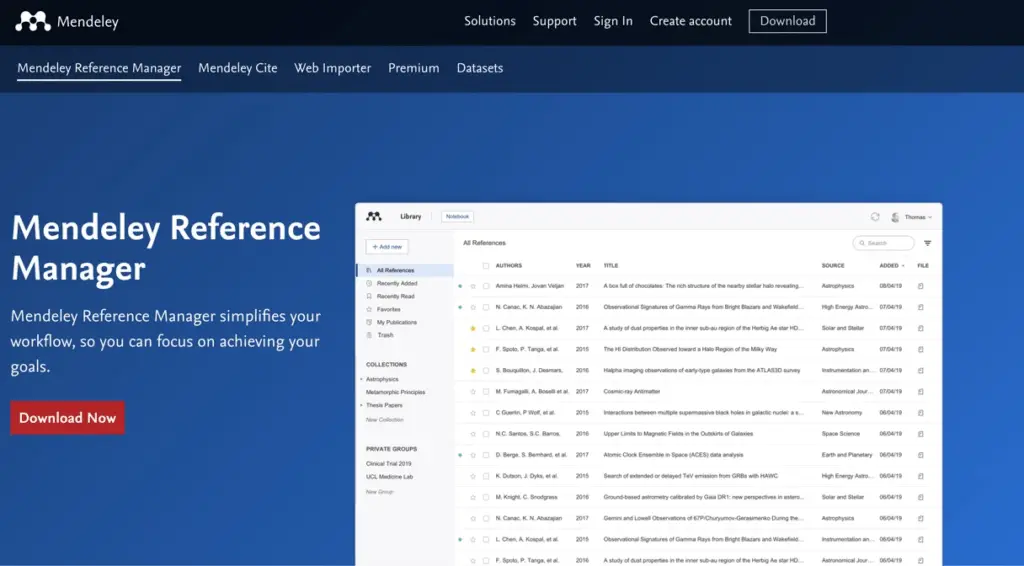
Pros of Mendeley
- Mendeley is a widely used reference management tool that combines citation management, PDF organization, and collaboration features.
- It allows users to import and organize their research papers, generate citations, and create bibliographies in different citation styles.
- Mendeley facilitates collaboration by enabling users to share references, notes, and annotations with colleagues and peers.
Cons of Mendeley
- The free version of Mendeley has limitations on storage capacity, which could be a constraint for researchers with extensive libraries of PDFs.
- Users should regularly back up their Mendeley libraries to avoid data loss or syncing issues.
EndNote
Over other tools, Endnote offers a number of noteworthy advantages. It facilitates browsing through thousands of relevant academic resources and provides automatic PDF downloads. You can share PDFs or your library with an infinite number of individuals with this reference manager.

Pros of EndNote
- EndNote is a comprehensive reference management tool that helps researchers collect, organize, and format citations and references.
- It offers a vast collection of citation styles and allows users to customize their own styles.
- EndNote facilitates collaboration through features that enable users to share libraries and references with team members.
Cons of EndNote
- EndNote’s extensive functionalities may have a steeper learning curve for new users compared to other citation management tools.
- The software requires a subscription, which might be a barrier for researchers with limited budgets.
Scholarcy
You may identify and properly reference sources with the help of Scholarcy. You can track your progress, write outlines, and summarise articles with Scholarcy.
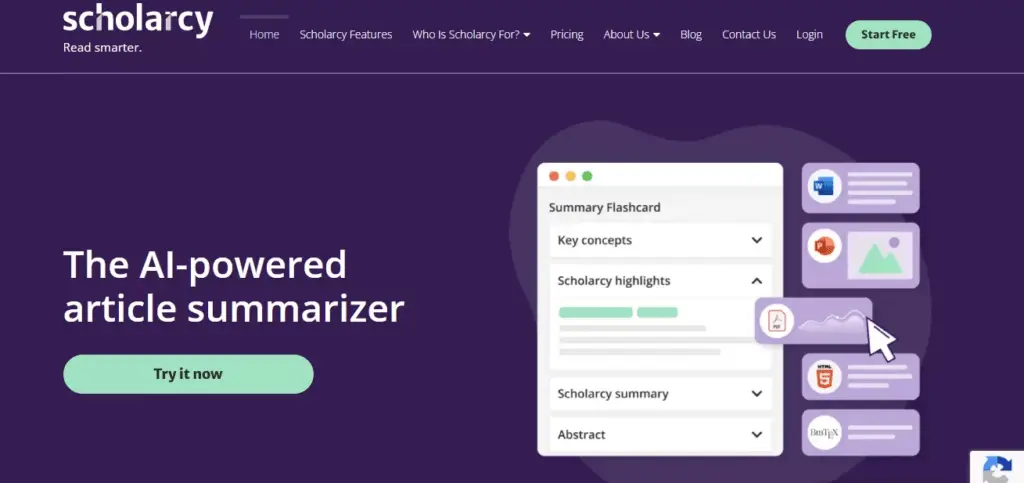
Pros of Scholarcy
- Scholarcy is an AI tool that automatically generates summaries and key points from research papers, simplifying the citation selection process.
- It offers citation formatting in various styles, including APA, MLA, and Harvard, ensuring accuracy and consistency in referencing.
- Scholarcy’s interactive interface allows users to highlight important sections, annotate papers, and organize their citations effectively.
Cons of Scholarcy
- While Scholarcy provides automated summaries, researchers should still review the original papers for in-depth understanding and context.
- Users should double-check the generated citations to ensure they meet the specific requirements of their target citation style.
Trinka AI
Trinka AI is a comprehensive writing assistant that includes a citation generator. Trinka can assist you with finding sources, formatting citations, and writing a paper that is both clear and short.
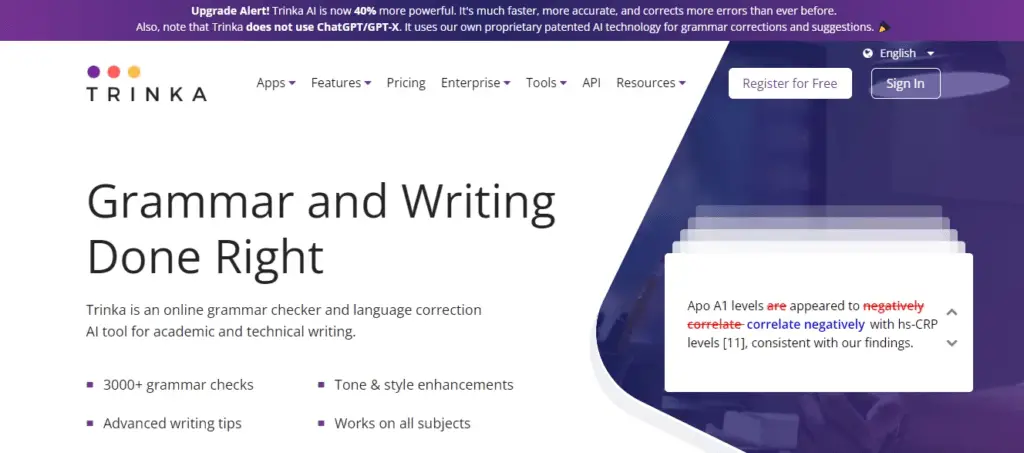
Pros of Trinka AI
- Trinka AI is an AI-powered writing assistant that helps researchers manage citations, grammar, and language-related issues in their papers.
- It offers suggestions for improving the clarity and readability of citations, enhancing the overall quality of academic writing.
- Trinka AI integrates with popular word processing software, making it convenient for researchers to access its features while writing their papers.
Cons of Trinka AI
- Trinka AI’s citation suggestions should be used as a guide, and researchers should verify the accuracy and appropriateness of the recommended citations.
- The tool may not cover all citation styles or accommodate specific formatting requirements, necessitating manual adjustments in some cases.
Chegg
Chegg is a citation manager and grammar checker designed specifically for students. Academics can use the citation generator to generate cost-free manual citations of blog posts, articles, and books. It supports MLA, APA, Chicago, and other stylers.

Pros of Chegg
- Chegg is an educational platform that provides a range of resources for students and researchers, including citation management tools.
- It offers citation generators that automate the process of creating accurate citations in various styles.
- Chegg’s extensive database and user-friendly interface make it a convenient tool for managing citations and references.
Cons of Chegg
- Chegg’s citation generators may not cover less common or specialized citation styles, requiring manual citation creation in such cases.
- Users should review the generated citations for accuracy, as automated tools may occasionally make errors or miss specific details.
| AI Tool | Pros | Cons |
|---|---|---|
| Quillbot | ✔Many valuable tools beyond a citation manager ✔Easy to use | ❌Grammar checker is not as powerful as competitors ❌Features may overwhelm new users |
| Scite AI | ✔ Provides context and credibility information ✔ Unique “Smart Citations” feature ✔ Enhances the quality of work | ❌Limited database coverage ❌ Independent verification needed |
| Paper Digest | ✔Scans and analyzes research papers ✔ Summarizes papers ✔ Personalized recommendations | ❌ Relies on data quality and comprehensiveness ❌ Review of original papers needed |
| Semantic Scholar | ✔Comprehensive access to research papers ✔ Analyzes and understands content ✔Offers citation metrics | ❌May not include all research articles ❌ Critical judgment required |
| Scholarcy | ✔Generates summaries and key points ✔Offers various citation styles ✔ Interactive interface | ❌Review of original papers needed ❌ Citation style adjustments may be required |
| Trinka AI | ✔ Helps manage citations, grammar, and language ✔Offers suggestions for clarity ✔Integrates with word processors | ❌Verification of recommended citations ❌ May not cover all citation styles |
| Chegg | ✔Provides citation generators ✔ User-friendly interface ✔ Extensive database | ❌ May not cover all citation styles ❌ Review of generated citations needed |
| Mendeley | ✔Combines citation management and PDF organization ✔ Collaboration features ✔ Customization options | ❌Limited storage capacity in free version ❌ Regular library backup required |
| EndNote | ✔Comprehensive reference management ✔ Vast collection of citation styles ✔ Collaboration features | ❌Steeper learning curve ❌ Requires subscription |
Conclusion
AI tools have greatly simplified and automated the citation management process. Each tool mentioned above offers unique features and benefits, catering to the diverse needs of researchers.
However, it is essential for users to exercise critical judgment, review the generated citations, and ensure the accuracy and relevance of the references in their specific research contexts.
These AI tools provide valuable assistance in organizing and formatting citations, ultimately enhancing the quality and credibility of scholarly work.
FAQs
Q1. Why should I use a citation software program?
A citation management program should be used because it can help you save time and guarantee the accuracy of your references. This will allow you to properly attribute works while making the most efficient use of your writing time.
Q2. Which Software is Best for Citations?
The top-of-the-line citation management tool is Endnote. Having said that, Quillbot is a favourite of ours because of its low prices and ease of use. It offers good academic functionality like a grammar checker. Because it is so simple to use.
Q3. Are these AI tools compatible with different citation styles?
Yes, the mentioned AI tools support various citation styles such as APA, MLA, and Chicago, among others. Users can customize the citation styles according to their specific requirements.
Q4. Can AI tools detect and correct citation errors?
AI tools have built-in algorithms that can identify missing information in citations and suggest potential sources. However, it is still important for users to review and verify the generated citations for accuracy.
Q5. Do these AI tools offer integration with reference databases?
Yes, AI tools can integrate with popular reference databases and academic search engines to retrieve citation details automatically. This integration enhances the accuracy and efficiency of the citation management process.
Q6. Can these AI tools generate citations for non-English sources?
Yes, some AI tools mentioned here support multiple languages, allowing users to generate citations for non-English sources as well.
Q7. Are these AI tools suitable for both individual researchers and institutions?
Yes, these AI tools cater to the needs of both individual researchers and institutions. They offer features that can be scaled and customized to accommodate various research requirements.
Other articles
Please read through some of our other articles with examples and explanations if you’d like to learn more.
Tools
- QuillBot
- Paraphraser.io
- Imagestotext.io
- Websites to Read Books for Free
- Tools to Convert PNG Image to Excel
- Detect AI-Generated Text using ZeroGPT and Transform It using Quillbot
- How is QuillBot used in Academic Writing?
- Tools for Presentations
- AI Tools for Citation Management
- Improve your Writing with QuillBot and ChatGPT
- Tools Transforming Knowledge Management
- Plagiarism Checkers Online
- Information Management Software
- Tools for Information Management
- Software Tools for Writing Thesis
- OpenAI WordPress Plugin
- TTS Voiceover
- Backend Automation Testing Tools
- AI Tools for Academic Research
Tech Hacks
Technology
- Firmware and Software
- WSN and IoT
- Flash Drive Vs Pen Drive
- Type A, B and C USB Cable
- Neuralink
- ReactJS
- Software Development Life Cycle Vs Software Testing Life Cycle
- Software Development Team vs Freelancer
- Quorum vs Hyperledger Fabric vs R3 Corda
- ChatGPT vs. Google Bard
- Quantum Apocalypse
- Synergy vs. KVM Switches
- eSourcing and eProcurement
- eProcurement and Traditional Procurement
- Over the Top and Video On Demand
- HDMI over IP vs HDBaseT
- Display Stream Compression
- Top Internet of Things Journals
- Supervised Learning vs. Unsupervised Learning
- Video Upscaling and Video Downscaling
- How To Build a Distributed System
- How to Get Into Data Science From a Non-Technical Background?
- How To Build Ethereum Mining Rig?
- How AI is Helpful For Marketers
- AI Chatbots Can Identify Trading Patterns
ChatGPT
- Paraphrase Text
- PowerPoint Slides
- Learn Languages
- Write Code in Python
- Write Literature Review
- Document Review
- Job Interview Preparation
- Prompts For Students
- Write Cover Letter
- Write Resume
- Write Code
- Job Applications
- Write SQL Queries
- Write Excel Formulas
- Academic Writing
- Translate Text
- Keyword Research
- Business Idea Generation
- Business Entrepreneur
- Use ChatGPT on WhatsApp
- Virtual Research Assistant
- Meta-Analysis in Research
- Large Documents
- Hypothesis Development
- Share ChatGPT Responses
- Text Analysis
- Upload PDF on ChatGPT
- Books ChatGPT



